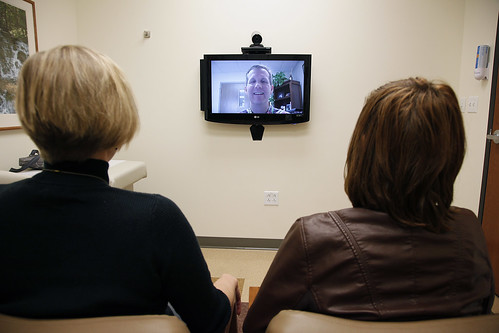Should you become a telemedicine physician? Now may be the time to consider adding telemedicine to your services.
Dr. Phil McGraw may not be a medical doctor, but he could be helping pave the way for a significant change in how the health care industry delivers care. The TV celebrity is serving as an advisor to the start-up Doctor on Demand, the latest business to enter the world of telemedicine.
While telemedicine is nothing new, McGraw’s name recognition could help fuel the already explosive growth projected for the field. By 2018, it is estimated up to 7 million patients will be using telehealth services, according to a report from IHS Technology. For physicians and other healthcare providers, now may be the time to consider whether to add telemedicine to your repertoire.[Tweet “Should You Become A Telemedicine Physician? #telehealth #mhealth”]
Related: 72% of Consumers Are Willing to See a Doctor Via Telehealth Video Conferencing
How Telemedicine is Provided?

Telemedicine, or telehealth as it is sometimes called, can have benefits for both patients and physicians.
In the past, telemedicine involved connecting with a medical professional over the phone for a brief consultation. Today, in a world filled with computers and smartphones, these consultations increasingly involve video conferencing technology that allows for face-to-face communication. Either way, telemedicine may result in less travel and ER visits for patients and lower overhead for physicians.
While some physicians have made telemedicine a part of their own practice, this type of care is more commonly provided by companies that contract with doctors. Some of the businesses providing telehealth services include the following:
- Teledoc
- Consult a Doctor
- InteractiveMD
- American Well
- Doctor on Demand
Generally, these companies work under a model in which a patient makes an initial call requesting a consultation. In some cases, they may complete an online evaluation outlining their concern and medical history. Then, the company has a physician call back within a specified period of time.
Teledoc, which says its 2002 founding makes it the nation’s first and largest telemedicine provider, reports its consultations last an average of 17 minutes. In addition, 96 percent of their physicians and 95 percent of members are satisfied with their experience.
Related: Survey: 76% of Patients Would Choose Telehealth Over Human Contact
What Telehealth Providers Should Know
From a practical standpoint, signing up as a contractor with a telemedicine business may be the easiest way to enter the field of telehealth provider. These companies have already set up the system and are responsible for marketing and administration. Often, all practitioners need is the right computer equipment and private place in which to connect with patients.
According to Doctor on Demand, patients contact doctors about non-emergency matters, with the following being common concerns:
- Fever
- Rashes
- Urinary tract infections
- GI issues
- Allergies
- Prescription refills
Depending on the company, providers may be able to refer patients for labs or imaging if warranted. In addition, some companies allow physicians to write certain prescriptions, while others do not provide that service.
Scheduling and pay will vary by company as well. For example, Doctor on Demand asks physicians to sign up for a shift in which they will be available. The company charges patients $40 per consultation, of which $30 goes to the doctor. Other companies may have different availability requirements and pay structures.
Malpractice, always a concern, may be less of an issue in telemedicine which tends to address short-term, minor health problems. As of this writing, Teledoc says it is has never had a malpractice claim.
What to Consider Before Signing Up
Doctors who think they’re ready to give telemedicine a try should investigate several different companies before signing up. While doctors could conceivably provide telehealth services full-time, most use telemedicine to supplement their income. Providers will want to find a company that will complement, not conflict with, a full-time job.
Before a provider selects a telehealth company, he or she should ask these questions:
- How much will I be paid per consultation?
- When are payments made and what payment method is used?
- Do I need to be available for a specific shift?
- Am I allowed to decline consultations?
- Am I required to complete a minimum number of consultations per week to remain active in the system?
- What equipment do I need?
- Can I refer patients to my personal practice for follow-up?
- Is malpractice coverage available?
Related: 3 Best Practices for Selling Telehealth Products or Services
Right now, most telehealth businesses work solely with physicians, but that could change as time and money constraints continue to squeeze the health care industry. Nurse practitioners, physician assistants and other health care professionals may soon be called upon to provide convenient and cost-effective care 24 hours a day via telemedicine.
In the meantime, the opportunity exists for physicians to be a part of this emerging field. Demand for telemedicine shows no signs of slowing in the coming years and that means now could be the perfect time for doctors to add telehealth services to their resumes.
Related: Top Five Areas for Telehealth Growth
photo credit: Mercy Health via cc

